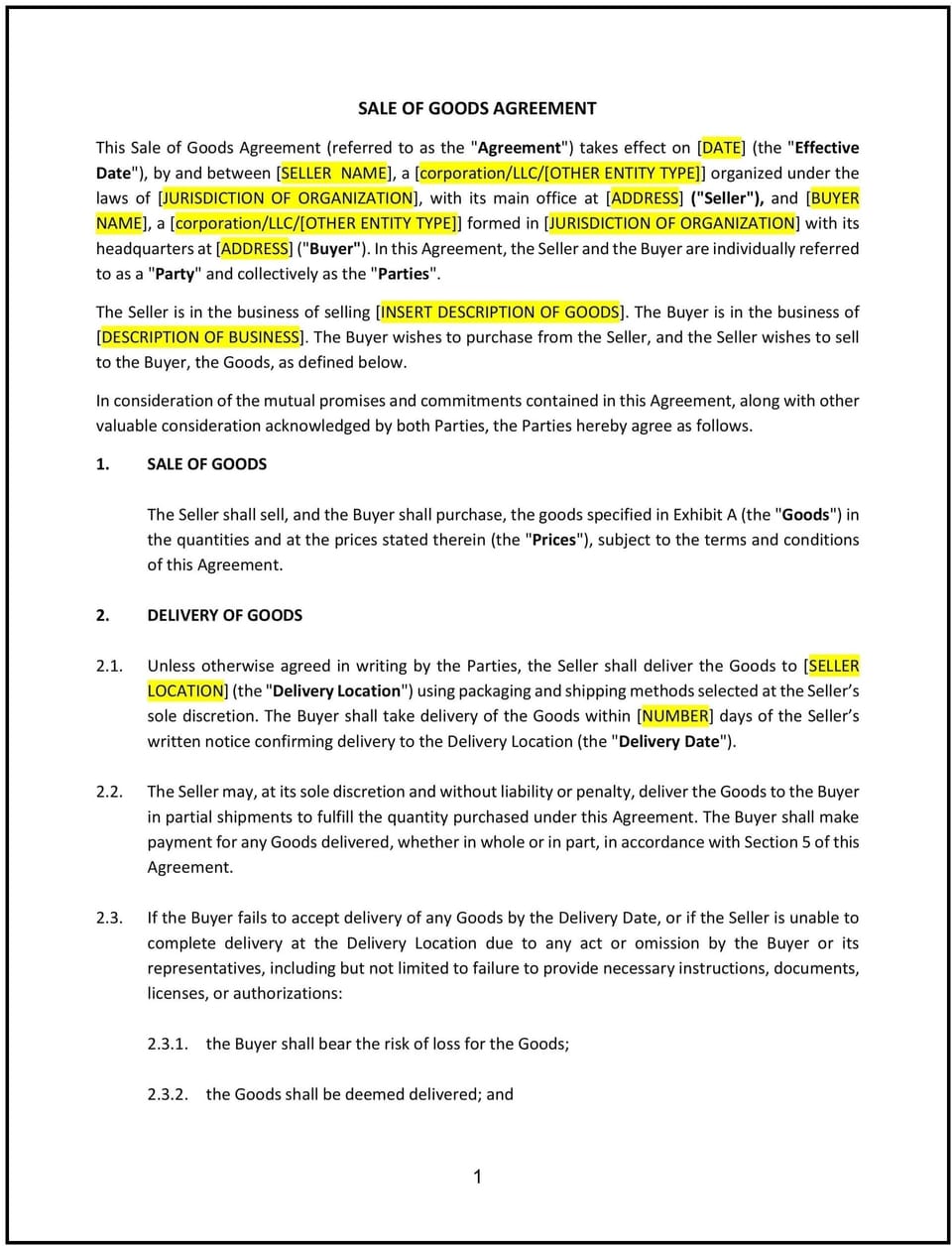Sale of Goods Agreement (Pro-Seller) (Hawaii): Free template

Sale of Goods Agreement (Pro-Seller) (Hawaii)
A Sale of Goods Agreement (Pro-Seller) in Hawaii is a legally binding contract that defines the terms of a transaction between a seller and a buyer. This agreement is essential for protecting the seller’s interests by establishing clear payment obligations, delivery terms, risk allocation, and warranty disclaimers. It is commonly used in industries such as wholesale distribution, retail, agriculture, and e-commerce, where businesses regularly engage in the sale of goods.
Hawaii follows Uniform Commercial Code (UCC) Article 2, which regulates the sale of goods and provides guidelines on contract formation, warranties, and risk of loss. Additionally, the state enforces consumer protection laws, including regulations under the Hawaii Revised Statutes (HRS) that govern deceptive trade practices and warranties for consumer goods. Businesses selling products in Hawaii must ensure their agreements align with both UCC provisions and state-specific consumer protection regulations.
A well-structured agreement helps sellers in Hawaii secure payments, clarify shipping terms, and limit liability while supporting compliance with state and federal laws.
Tips for drafting and maintaining a Sale of Goods Agreement (Pro-Seller) in Hawaii
- Clearly describe the goods being sold, including specifications, quantity, and pricing to avoid misunderstandings.
- Establish payment terms, including invoice due dates, acceptable payment methods, and penalties for late payments. Hawaii law allows sellers to charge late fees if they are reasonable and disclosed in the contract.
- Define delivery obligations, including shipping timelines, costs, and when the risk of loss transfers to the buyer. Under Hawaii UCC Article 2, risk of loss generally shifts to the buyer upon receipt unless otherwise stated.
- Include warranty disclaimers to protect the seller from liability. Hawaii law allows sellers to exclude implied warranties such as merchantability and fitness for a particular purpose, but disclaimers must be clearly written.
- Outline return and refund policies. Sellers may limit returns in business-to-business transactions, but consumer transactions may be subject to additional protections under Hawaii consumer protection laws.
- Include a force majeure clause to account for unforeseen events such as natural disasters, supply chain disruptions, or shipping delays that could affect the seller’s ability to fulfill obligations.
Frequently asked questions (FAQs)
Q: What should Hawaii businesses include in a Sale of Goods Agreement (Pro-Seller)?
A: The agreement should include product descriptions, payment terms, delivery conditions, warranty disclaimers, and dispute resolution procedures to protect the seller’s interests.
Q: How does a Sale of Goods Agreement (Pro-Seller) benefit sellers in Hawaii?
A: It ensures enforceable sales terms, reduces disputes over product defects or late payments, and provides clear guidelines for transactions.
Q: Are warranty disclaimers enforceable in Hawaii?
A: Yes, under Hawaii UCC Article 2, sellers can disclaim implied warranties, but they must do so explicitly in the contract. Consumer sales may be subject to additional protections under state law.
Q: What happens if a buyer refuses to pay under a Sale of Goods Agreement in Hawaii?
A: The seller may pursue legal remedies, including contract enforcement, collections, or repossession of goods, depending on the terms outlined in the agreement.
Q: How should Hawaii sellers handle disputes under a Sale of Goods Agreement?
A: The contract should specify dispute resolution methods, such as arbitration, mediation, or legal action in Hawaii courts.
Q: Does Hawaii require sales tax on goods sold under this agreement?
A: Hawaii does not have a traditional sales tax but imposes a General Excise Tax (GET) on businesses selling goods and services. Sellers must register and comply with state tax regulations.
Q: Can a seller refuse returns under a Sale of Goods Agreement in Hawaii?
A: Yes, sellers can limit or prohibit returns in business-to-business sales, but consumer transactions may require compliance with additional refund policies under state law.
This article contains general legal information and does not contain legal advice. Cobrief is not a law firm or a substitute for an attorney or law firm. The law is complex and changes often. For legal advice, please ask a lawyer.


